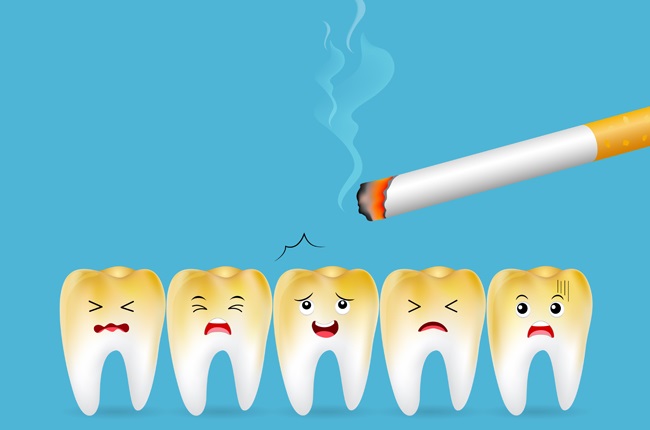
- Smoking can harm your oral health.
- People who smoke cigarettes regularly are at a higher risk of tooth discolouration, bad breath, gum disease and even oral cancer.
- You can do some things to take better care of your oral health while weaning yourself off cigarettes, like brushing and flossing regularly and using a salt water rinse.
We all know about the danger cigarettes pose; it's often associated with cancer and heart disease. But you may be giving less thought to the effect smoking can have on your oral hygiene.
Smoking can have a significant impact on your teeth, gums and mouth. Dirna Grobbelaar, an oral hygiene advisor for Ivohealth and a member of the Oral Hygienists Association of South Africa, shares some insights into what smoking does to your oral health.
Tooth discolouration and staining
Tooth discolouration is one of the most noticeable effects of smoking on your oral health. "The nicotine and tar found in cigarettes can quickly stain your teeth yellow or even brown over time. This not only affects the appearance of your smile but also makes cleaning more difficult," the press statement shared on behalf of Grobebelaar explains.
Stained teeth are also more prone to cavities because of plaque build-up.
READ MORE | Bad habits: How the government can help you quit smoking -- but isn't
Bad breath (Halitosis)
Smoking can lead to persistent bad breath. This is also known as halitosis. The chemicals found in tobacco can stay in your mouth long after you have finished your cigarette, which causes an unpleasant odour that can be difficult to remove.
Gum disease
Bleeding gums and gum disease are no fun, and as a smoker, you may be at a higher risk of developing both. Smoking also reduces blood flow to the gums, which can result in gingivitis and can progress into gum disease if left untreated, ultimately leading to tooth loss.
Impaired healing process after dental procedures
Smoking can weaken your body's natural healing process after dental procedures like tooth extractions or gum surgery, for example. As mentioned above, smoking can restrict blood flow to the gums, leading to prolonged recovery times and an increased risk of infections and implant failure.
Oral Cancer
Smokers are at an increased risk of developing oral cancer. "According to the American Cancer Society, about 90% of people with oral cancer have used tobacco in some form. Smokers are six times more likely to develop oral cancers than non-smokers, including cancers affecting the lips, tongue, cheeks, throat, and floor of the mouth," the statement reads.
READ MORE | 'Infections, pneumonia and heart attacks': The risks of smoking before surgery
Reduced Sense of Taste and Smell
Your taste buds and olfactory receptors are at risk of being damaged by the chemicals found in cigarettes, which could then result in a weakened sense of taste and smell.
Dry Mouth (Xerostomia)
Smokers may experience a reduction in saliva which leads to dryness. Saliva is important for good oral hygiene as it washes away the bacteria responsible for cavities and gum disease while also neutralising harmful acids in the mouth.
Increased plaque and tartar build-up
Increased plaque and tartar build-up on teeth, brought on by smoking, could lead to tooth decay and gum disease.
READ MORE | Cancer in the under 50s is rising, globally -- why?
How to take care of your oral health as a smoker
Quitting is no easy feat, but there are some things you can do to take better care of your oral health while you wean yourself off of cigarettes.
-Brush your teeth twice a day with a soft-bristled toothbrush and toothpaste specifically designed to care for your gums.
-Floss daily.
-After smoking, rinse your mouth with salt water. This will also help with dry mouth.
-The tongue is one of the most common sources of bad breath -- consider using a tongue scraper to clean your tongue and help keep your breath fresh.
"Have a professional cleaning at least every six months. Look for a practice offering EMS Guided Biofilm Therapy, a breakthrough oral hygiene treatment that is extremely gentle but provides superior plaque removal. As a smoker, it's very important to see a dental professional regularly to help minimise risks and improve your oral health," says Grobbelaar.




 Publications
Publications
 Partners
Partners











